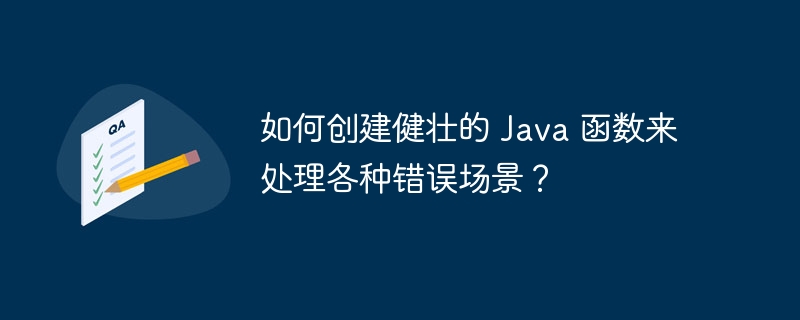How to create robust Java functions to handle various error scenarios?
在 Java 中创建健壮函数处理错误场景的方法包括:使用 try-catch 块隔离错误代码并执行特定异常处理。抛出异常让调用方决定如何处理错误。创建自定义异常类提供更多错误详细信息。

如何创建健壮的 Java 函数来处理各种错误场景
在现实世界的应用程序中,处理错误场景至关重要,以确保应用程序的稳定性和可靠性。在 Java 中,有几种方法可以创建健壮的函数来应对各种错误场景。
1. 使用 try-catch 块
try-catch 块是一种常见的错误处理机制,它允许您指定需要尝试的代码块,以及在出现异常时要执行的代码块。例如:
try {
// 尝试执行的代码
} catch (Exception e) {
// 出现异常时执行的代码
}2. 抛出异常
在某些情况下,您可能希望将错误作为异常抛出,从而让调用方决定如何处理错误。例如:
public void someMethod() throws Exception {
// ...
// 如果出现错误,抛出异常
// ...
}3. 使用自定义异常类
您可以创建自己的自定义异常类,从而提供更多错误详细信息。例如:
public class MyException extends Exception {
private String message;
public MyException(String message) {
this.message = message;
}
public String getMessage() {
return message;
}
}实战案例
假设我们有一个函数需要根据给定的文件路径读取文件内容。如果文件不存在或无法读取,我们希望抛出异常。
import java.io.File;
import java.io.FileNotFoundException;
import java.util.Scanner;
public class ReadFile {
public static String readFile(String filePath) throws FileNotFoundException {
File file = new File(filePath);
// 检查文件是否存在
if (!file.exists()) {
throw new FileNotFoundException("File not found: " + filePath);
}
// 尝试读取文件内容
try (Scanner scanner = new Scanner(file)) {
return scanner.useDelimiter("\\Z").next();
}
}
public static void main(String[] args) {
try {
String contents = readFile("path/to/file.txt");
// 使用文件内容
} catch (FileNotFoundException e) {
// 处理文件不存在或无法读取的情况
}
}
}优势
创建健壮的 Java 函数来处理各种错误场景有很多优势,包括:
- 应用程序稳定性:它可以防止应用程序在遇到错误时崩溃或产生不可预期的行为。
- 可维护性:它使应用程序易于维护,因为错误处理逻辑与业务逻辑分离。
- 可扩展性:它允许您轻松适应未来的错误场景。
The above is the detailed content of How to create robust Java functions to handle various error scenarios?. For more information, please follow other related articles on the PHP Chinese website!

Hot AI Tools

Undresser.AI Undress
AI-powered app for creating realistic nude photos

AI Clothes Remover
Online AI tool for removing clothes from photos.

Undress AI Tool
Undress images for free

Clothoff.io
AI clothes remover

AI Hentai Generator
Generate AI Hentai for free.

Hot Article

Hot Tools

Notepad++7.3.1
Easy-to-use and free code editor

SublimeText3 Chinese version
Chinese version, very easy to use

Zend Studio 13.0.1
Powerful PHP integrated development environment

Dreamweaver CS6
Visual web development tools

SublimeText3 Mac version
God-level code editing software (SublimeText3)

Hot Topics
 Square Root in Java
Aug 30, 2024 pm 04:26 PM
Square Root in Java
Aug 30, 2024 pm 04:26 PM
Guide to Square Root in Java. Here we discuss how Square Root works in Java with example and its code implementation respectively.
 Perfect Number in Java
Aug 30, 2024 pm 04:28 PM
Perfect Number in Java
Aug 30, 2024 pm 04:28 PM
Guide to Perfect Number in Java. Here we discuss the Definition, How to check Perfect number in Java?, examples with code implementation.
 Random Number Generator in Java
Aug 30, 2024 pm 04:27 PM
Random Number Generator in Java
Aug 30, 2024 pm 04:27 PM
Guide to Random Number Generator in Java. Here we discuss Functions in Java with examples and two different Generators with ther examples.
 Armstrong Number in Java
Aug 30, 2024 pm 04:26 PM
Armstrong Number in Java
Aug 30, 2024 pm 04:26 PM
Guide to the Armstrong Number in Java. Here we discuss an introduction to Armstrong's number in java along with some of the code.
 Weka in Java
Aug 30, 2024 pm 04:28 PM
Weka in Java
Aug 30, 2024 pm 04:28 PM
Guide to Weka in Java. Here we discuss the Introduction, how to use weka java, the type of platform, and advantages with examples.
 Smith Number in Java
Aug 30, 2024 pm 04:28 PM
Smith Number in Java
Aug 30, 2024 pm 04:28 PM
Guide to Smith Number in Java. Here we discuss the Definition, How to check smith number in Java? example with code implementation.
 Java Spring Interview Questions
Aug 30, 2024 pm 04:29 PM
Java Spring Interview Questions
Aug 30, 2024 pm 04:29 PM
In this article, we have kept the most asked Java Spring Interview Questions with their detailed answers. So that you can crack the interview.
 Break or return from Java 8 stream forEach?
Feb 07, 2025 pm 12:09 PM
Break or return from Java 8 stream forEach?
Feb 07, 2025 pm 12:09 PM
Java 8 introduces the Stream API, providing a powerful and expressive way to process data collections. However, a common question when using Stream is: How to break or return from a forEach operation? Traditional loops allow for early interruption or return, but Stream's forEach method does not directly support this method. This article will explain the reasons and explore alternative methods for implementing premature termination in Stream processing systems. Further reading: Java Stream API improvements Understand Stream forEach The forEach method is a terminal operation that performs one operation on each element in the Stream. Its design intention is






